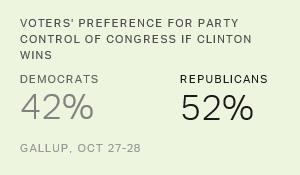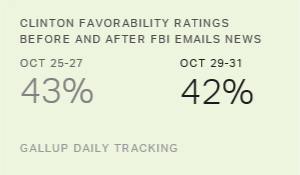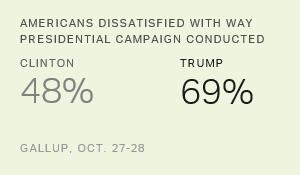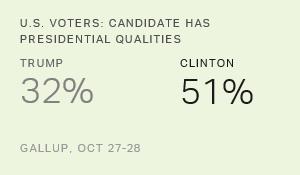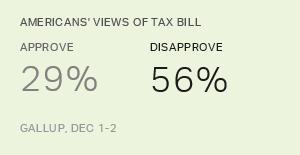Story Highlights
- Majority of voters (52%) want GOP to lead Congress if Clinton wins
- Voters are evenly split on who should lead Congress if Trump wins
- Trump results are similar to what Gallup has measured in past elections
PRINCETON, N.J. -- U.S. voters want divided-party government if Hillary Clinton is elected president but are split on whether they would prefer unified or divided government if Donald Trump wins. By 52% to 42%, registered voters say they want the Republicans rather than the Democrats to control Congress if Clinton wins. Should Trump win, 48% want Republicans to control Congress, and 46% would prefer Democrats to do so.
| If Clinton is elected | If Trump is elected | ||||||||||||||||||||||||||||||||||||||||||||||||||||||||||||||||||||||||||||||||||||||||||||||||||
|---|---|---|---|---|---|---|---|---|---|---|---|---|---|---|---|---|---|---|---|---|---|---|---|---|---|---|---|---|---|---|---|---|---|---|---|---|---|---|---|---|---|---|---|---|---|---|---|---|---|---|---|---|---|---|---|---|---|---|---|---|---|---|---|---|---|---|---|---|---|---|---|---|---|---|---|---|---|---|---|---|---|---|---|---|---|---|---|---|---|---|---|---|---|---|---|---|---|---|---|
| % | % | ||||||||||||||||||||||||||||||||||||||||||||||||||||||||||||||||||||||||||||||||||||||||||||||||||
| Prefer Republicans control Congress | 52 | 48 | |||||||||||||||||||||||||||||||||||||||||||||||||||||||||||||||||||||||||||||||||||||||||||||||||
| Prefer Democrats control Congress | 42 | 46 | |||||||||||||||||||||||||||||||||||||||||||||||||||||||||||||||||||||||||||||||||||||||||||||||||
| Gallup, Oct 27-28 | |||||||||||||||||||||||||||||||||||||||||||||||||||||||||||||||||||||||||||||||||||||||||||||||||||
The results are based on an Oct. 27-28 Gallup poll, taken as FBI Director James Comey announced on Oct. 28 the agency discovered new emails that could be pertinent to the investigation of Clinton's handling of government emails while serving as secretary of state. While voters expressed a preference for a GOP Congress under Clinton on both nights of interviewing, their preference was somewhat stronger after the announcement than before it.
Voters' preference for a Republican Congress if Clinton is elected may be related to concerns about her ideology. A majority of voters, 58%, describe Clinton's views as being "liberal" or "very liberal." A smaller percentage, 47%, describe Trump as "conservative" or "very conservative." Consequently, voters may see more of a need to "balance" Clinton with an opposition Congress than they do for Trump.
Voters may also see a greater need to pair Clinton with an opposition Congress because they may see her winning as the more likely outcome. Clinton has led in presidential preference polls for nearly all of the campaign, and most popular forecasting models see her election as more probable.
As might be expected, Republican and Democratic voters overwhelmingly want their own party to control Congress regardless of who is elected president. As such, independents' views tip the balance among registered voters nationally.
Fifty-six percent of independents say they want the Republican Party to control Congress if Clinton is elected, while 34% want the Democratic Party in charge -- a clear preference for divided government under a Clinton presidency. By a smaller margin, independent voters lean toward wanting the GOP (49%) rather than the Democrats (40%) to control Congress if Trump is elected.
| Republicans | Independents | Democrats | ||||||||||||||||||||||||||||||||||||||||||||||||||||||||||||||||||||||||||||||||||||||||||||||||||
|---|---|---|---|---|---|---|---|---|---|---|---|---|---|---|---|---|---|---|---|---|---|---|---|---|---|---|---|---|---|---|---|---|---|---|---|---|---|---|---|---|---|---|---|---|---|---|---|---|---|---|---|---|---|---|---|---|---|---|---|---|---|---|---|---|---|---|---|---|---|---|---|---|---|---|---|---|---|---|---|---|---|---|---|---|---|---|---|---|---|---|---|---|---|---|---|---|---|---|---|---|
| % | % | % | ||||||||||||||||||||||||||||||||||||||||||||||||||||||||||||||||||||||||||||||||||||||||||||||||||
| If Clinton is elected | ||||||||||||||||||||||||||||||||||||||||||||||||||||||||||||||||||||||||||||||||||||||||||||||||||||
| Prefer Republicans control Congress | 91 | 56 | 9 | |||||||||||||||||||||||||||||||||||||||||||||||||||||||||||||||||||||||||||||||||||||||||||||||||
| Prefer Democrats control Congress | 6 | 34 | 87 | |||||||||||||||||||||||||||||||||||||||||||||||||||||||||||||||||||||||||||||||||||||||||||||||||
| If Trump is elected | ||||||||||||||||||||||||||||||||||||||||||||||||||||||||||||||||||||||||||||||||||||||||||||||||||||
| Prefer Republicans control Congress | 90 | 49 | 7 | |||||||||||||||||||||||||||||||||||||||||||||||||||||||||||||||||||||||||||||||||||||||||||||||||
| Prefer Democrats control Congress | 8 | 40 | 90 | |||||||||||||||||||||||||||||||||||||||||||||||||||||||||||||||||||||||||||||||||||||||||||||||||
| Gallup, Oct 27-28 | ||||||||||||||||||||||||||||||||||||||||||||||||||||||||||||||||||||||||||||||||||||||||||||||||||||
Voters Usually Divided on Who They Want to Control Congress
Gallup has asked the same question in recent presidential elections, including in 1996, 2004 and 2008. Most often, voters are divided on which party they want to control Congress under various presidential outcomes, as was the case in 1996 for Bill Clinton, in 2004 for John Kerry and George W. Bush, in 2008 for Barack Obama, and this year for Trump.
Voters' preference for a GOP-led Congress this year if Clinton wins marks the second major exception to the historical norm. The other was for John McCain in 2008, when 57% of voters preferred Democrats to control Congress if he was elected, compared with 38% preferring Republicans.
| Prefer Republicans | Prefer Democrats | |||||||||||||||||||||||||||||||||||||||||||||||||||||||||||||||||||||||||||||||||||||||||||||||||||
|---|---|---|---|---|---|---|---|---|---|---|---|---|---|---|---|---|---|---|---|---|---|---|---|---|---|---|---|---|---|---|---|---|---|---|---|---|---|---|---|---|---|---|---|---|---|---|---|---|---|---|---|---|---|---|---|---|---|---|---|---|---|---|---|---|---|---|---|---|---|---|---|---|---|---|---|---|---|---|---|---|---|---|---|---|---|---|---|---|---|---|---|---|---|---|---|---|---|---|---|---|
| % | % | |||||||||||||||||||||||||||||||||||||||||||||||||||||||||||||||||||||||||||||||||||||||||||||||||||
| 2008 | ||||||||||||||||||||||||||||||||||||||||||||||||||||||||||||||||||||||||||||||||||||||||||||||||||||
| If Obama elected | 48 | 47 | ||||||||||||||||||||||||||||||||||||||||||||||||||||||||||||||||||||||||||||||||||||||||||||||||||
| If McCain elected | 38 | 57 | ||||||||||||||||||||||||||||||||||||||||||||||||||||||||||||||||||||||||||||||||||||||||||||||||||
| 2004 | ||||||||||||||||||||||||||||||||||||||||||||||||||||||||||||||||||||||||||||||||||||||||||||||||||||
| If Kerry elected | 49 | 47 | ||||||||||||||||||||||||||||||||||||||||||||||||||||||||||||||||||||||||||||||||||||||||||||||||||
| If Bush re-elected | 45 | 42 | ||||||||||||||||||||||||||||||||||||||||||||||||||||||||||||||||||||||||||||||||||||||||||||||||||
| 1996 | ||||||||||||||||||||||||||||||||||||||||||||||||||||||||||||||||||||||||||||||||||||||||||||||||||||
| If Clinton re-elected | 46 | 47 | ||||||||||||||||||||||||||||||||||||||||||||||||||||||||||||||||||||||||||||||||||||||||||||||||||
| Note: Question not asked about Bob Dole being elected in 1996 | ||||||||||||||||||||||||||||||||||||||||||||||||||||||||||||||||||||||||||||||||||||||||||||||||||||
| Gallup | ||||||||||||||||||||||||||||||||||||||||||||||||||||||||||||||||||||||||||||||||||||||||||||||||||||
The 2008 McCain result probably reflected the unpopularity of the GOP at that time, when incumbent President Bush's job approval ratings were under 30%. Voters had also just elected Democratic majorities in both houses of Congress in the 2006 midterm elections and appeared to want to maintain that power structure if another Republican president succeeded Bush.
Implications
Americans are frustrated with the way the government is operating, with their trust in government still near record-low levels and dissatisfaction with government continuing to rank among the most important problems facing the country. Much of that frustration may stem from divided government, which has been the norm for all but two years in the past decade. With a president from one party and Congress from another, there has been little common ground to address major issues facing the country.
These frustrations may be one reason why Gallup found earlier this fall that fewer Americans (20%) than any time in recent memory say they want Congress controlled by one party and the president by another. At the same time, a minority of 36% say they want the same party to control both the presidency and Congress, with the rest, 44%, saying it doesn't matter or not having an opinion.
But while Americans may reject divided government in theory, their concerns about giving one party -- or one individual -- too much power may outweigh that preference. In particular, when presented with the possibility of a Clinton presidency, a majority say they would want Republicans in control of Congress.
Americans' voting preferences in recent years also support the notion that the public is uncomfortable with one party having control of both elected federal government branches. The last two times the nation had a Democratic president and Democratic Congress, after the 1992 and 2008 elections, voters gave the GOP control of at least one house of Congress in the next midterm election. Voters gave the Democrats control of Congress in the 2006 midterms after four years of unified Republican control of the government.
Congressional vote experts predict that Republicans will likely retain control of the House of Representatives in this year's elections, but party control of the Senate is uncertain. As a result, divided government appears probable if Clinton is elected. If Trump comes from behind to win, he would probably have a Republican House to work with but may face a Democratic Senate. Should he win and Republicans maintain control of both the House and the Senate, recent voting patterns suggest Americans may choose to check that power by electing Democratic majorities to Congress in 2018.
Historical data are available in Gallup Analytics.
Survey Methods
Results for this Gallup poll are based on telephone interviews conducted Oct. 27-28, 2016, on the Gallup U.S. Daily survey, with a random sample of 945 registered voters, aged 18 and older, living in all 50 U.S. states and the District of Columbia. For results based on the total sample of registered voters, the margin of sampling error is ±4 percentage points at the 95% confidence level. All reported margins of sampling error include computed design effects for weighting.
Each sample of national adults includes a minimum quota of 60% cellphone respondents and 40% landline respondents, with additional minimum quotas by time zone within region. Landline and cellular telephone numbers are selected using random-digit-dial methods.
View survey methodology, complete question responses and trends.
Learn more about how the Gallup U.S. Daily works.
